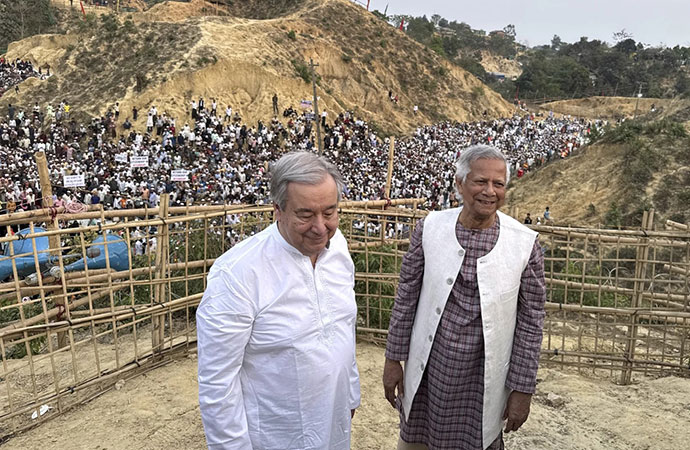Column

U.N. Secretary-General António Guterres and Bangladesh’s Chief Adviser and Nobel Laureate Professor Muhammad Yunus stand together at a Rohingya refugee camp in Cox’s Bazar during Ramadan on 14 March 2025. Photo: AP/UNB
The idea of a safe zone in Rakhine State to accommodate returning Rohingya refugees has been supported by the interim government of Bangladesh. A safe zone can be established under the United Nations flag or by a mutual agreement between Bangladesh and Myanmar. The rise of the Arakan Army has also changed the dynamics of the equation. With much of Rakhine State now falling under the control of the Arakan Army, Bangladesh's border with Myanmar is now effectively under the control of a non-state armed group. The Arakan Army is also aligned with Myanmar's anti-junta government-in-exile called the National Unity Government of Myanmar (NUG).
The Arakan Army is a Rakhine Buddhist nationalist militia which seeks to set up a one-party state in the historical region of Arakan. It is collecting taxes and engaged in governance activities in Rakhine State. The Arakan Army is also accused of committing atrocities against the minority Rohingya population.
Bangladesh has opened contacts with the Arakan Army for strategic purposes, including for the management of the border. Dhaka has called on the Arakan Army to include the Rohingya in its new administrative setup for Rakhine State. National Security Adviser Khalilur Rahman remarked that "we want to see Rohingyas included at every level of the new administrative setup in Rakhine. If they fail to do that, it will be evidence of ethnic cleansing. This is our red line".
Between a rock and a hard place
The evidence is increasingly pointing to ethnic cleansing under the Arakan Army. Since November 2023, an estimated 113,000 Rohingya refugees have fled to Bangladesh due to the civil war between the Arakan Army and Myanmar's junta. Some Rohingya have reportedly allied with the junta to fight against the Arakan Army to challenge Rakhine Buddhist domination in the Rohingya homeland.
Neither the Myanmar junta nor the Arakan Army have the vision, ambition nor foresight to establish the safe zone for the Rohingya. While the junta is being investigated in international courts for genocide against the Rohingya, evidence is mounting on the atrocities of the Arakan Army.
The situation is complicated by the lack of a unified and strong Rohingya leadership. Conservative Islamic militants continue to be the vanguard of the Rohingya movement for self-determination, including militant groups such as the Arakan Rohingya Salvation Army (ARSA) and the Rohingya Solidarity Organization (RSO). Both ARSA and RSO have been accused of engaging in human rights abuses in Rohingya refugee camps in Bangladesh, as well as inside Rakhine State. These reported abuses include kidnappings, torture and forced conscription.
A report by Fortify Rights documented the competing influence of militant groups in Bangladesh's sprawling refugee camps at Cox's Bazar. Rohingya civil society remains small and weak. Bangladesh's government has not adequately promoted Rohingya civil society voices to advocate the right of return. A broad, cohesive and sustained diplomatic campaign is required to promote Rohingya history and identity.
At Myanmar's federal level, the opposition NUG has pledged to take steps to restore Rohingya citizenship. The NUG has also included a Rohingya activist, U Aung Kyaw Moe, as part of its cabinet. But the NUG remains a government-in-exile with no possibility in sight of overthrowing the junta. The Rohingya have historically supported a federal system in Myanmar with the hope that federalism can ensure autonomy and guard against Rakhine domination.
Historical precedent
The first Prime Minister of Burma, U Nu, set up a federally-administered zone called the Mayu Frontier District which was governed from Rangoon from 1961 to 1964. The district covered the northern townships of Rakhine State which form the historical homeland of the Rohingya people. These townships include Maungdaw, Buthidaung and Rathedaung. The Rohingya were represented in Burma's first parliament as ministers, MPs and parliamentary secretaries. Rohingya politicians included health minister Sultan Mahmud, state minister Sultan Ahmed and lawmakers M. A. Gaffar and Zura Begum. Burmese state radio had a Rohingya language broadcast service.
The Rohingya community in the northern townships of Arakan were instrumental in Burma's rice economy. Muslim agriculturalists from the Chittagong Division of Bengal exported labour, capital and irrigation methods to colonial Arakan which contributed to Burma's rise as the world's largest rice exporter during the first half of the 20th century.
In 1964, military dictator Ne Win disbanded the Mayu Frontier District. Ne Win expelled Burma's Indian-origin community and instigated race riots against the country's Chinese community. By 1974, Ne Win introduced a socialist constitution which excluded the Rohingya from Burma's official list of ethnic groups. By 1982, the Rohingya were stripped of their right to citizenship through a controversial citizenship law. In 1989, the longstanding historical name of Arakan was renamed to Rakhine State to promote the dominance of the Rakhine majority and exclude the Rohingya minority.
A national security dilemma
A safe zone for the Rohingya can be ideally established in the region of the former Mayu District. But can Dhaka count on the support of the United Nations Security Council for a UN-supervised safe zone? Regional giants India and China have been reluctant to allow UN peacekeepers into the region, notwithstanding Bangladesh's position as a leading troop contributing nation to global peacekeeping. Myanmar's military also has close ties with Russia which has supported the junta on the Security Council.
In the absence of a UN mandate, Dhaka has to engage with non-state armed groups which are influential in Rakhine State. There is precedent for refugee-led repatriations in territories controlled by rebels. In El Salvador, FMLN-controlled areas received Salvadoran refugees from Honduras between 1985 and 1990 as part of a refugee-led repopulation movement. Unfortunately, neither the Arakan Army nor Rohingya groups like ARSA or RSO are capable of overseeing or facilitating this kind of liberal repatriation. All the rebel groups in Rakhine State stand accused of egregious human rights abuses.
For safe, voluntary and dignified repatriation, the goal has to be consequential improvements for the Rohingya in terms of living conditions, civil and political rights; economic, social and cultural rights; and a sustainable future for the beleaguered community inside Myanmar.
A protracted refugee crisis is a national security dilemma for Bangladesh. Dhaka has to strengthen its military to project regional influence to cope with regional threats and challenges. While both Bangladesh and Myanmar share Chinese military hardware and strategic ties with Beijing, Bangladesh has to undertake decisive leadership to address threats to peace and security on its doorstep.
Umran Chowdhury is Assistant Editor of the Dhaka Courier and Research Associate at the Cosmos Foundation and Bay of Bengal Institute.

























Leave a Comment
Recent Posts
Auspicious beginnings, but a l ...
The newly elected government of Bangladesh is now in office, and the e ...
Caught between tigers and pira ...
Over 10,000 fishermen in the Sundarbans have suspended their fishing a ...
Historic Chawk Bazar comes alive with iftar items on ..
Shaping Young Conservationists: School Conservation ..
Iran has said it has reached an understanding with t ..
New Finance Minister Amir Khosru Mahmud Chowdhury